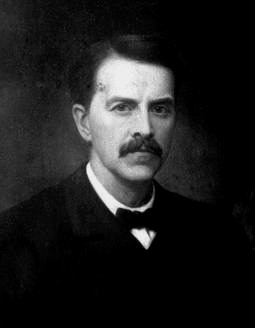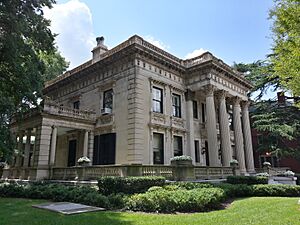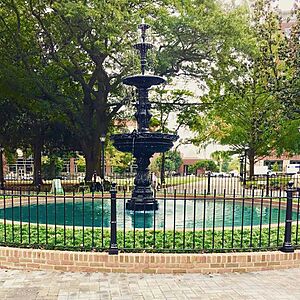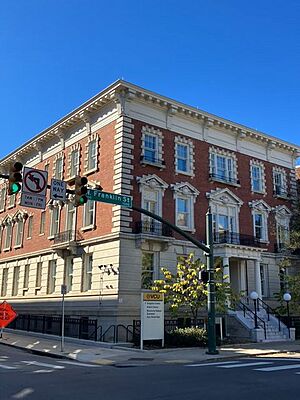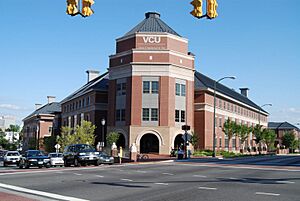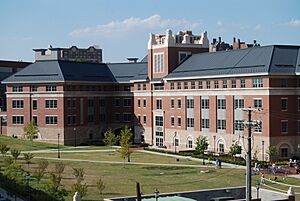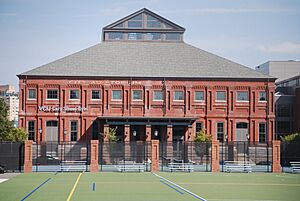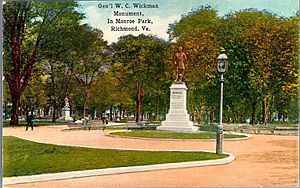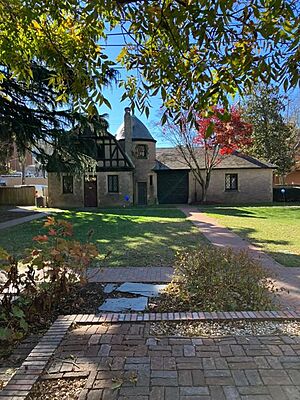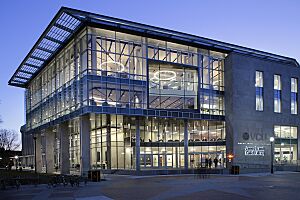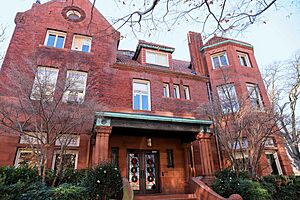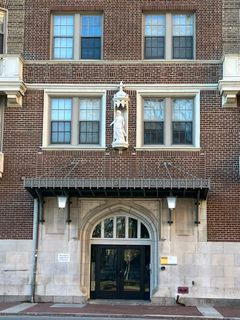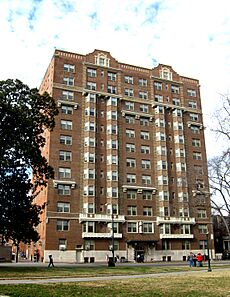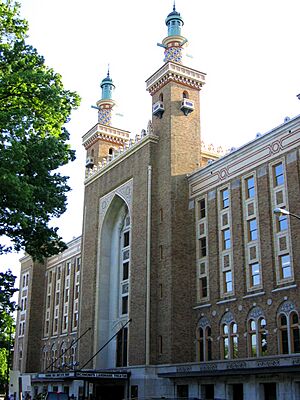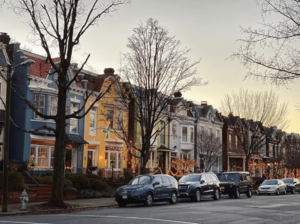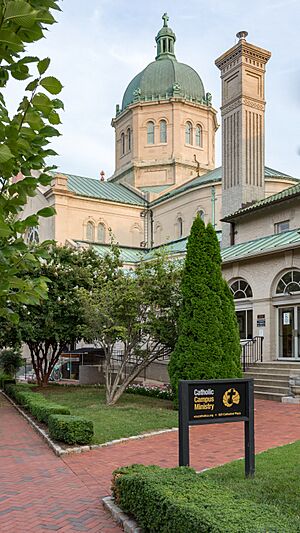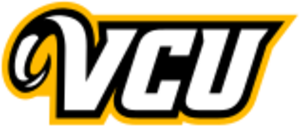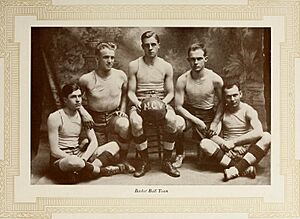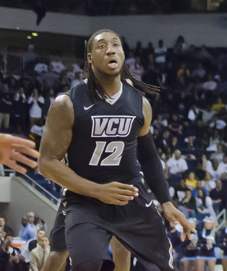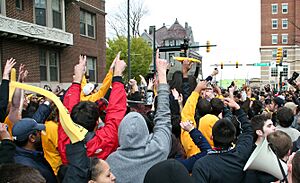Virginia Commonwealth University facts for kids
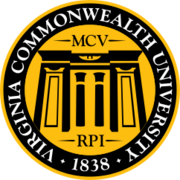 |
|
| Latin: Virginia rei Publicae Universitates | |
| Motto | Effice ut sit Realis (Latin) |
|---|---|
|
Motto in English
|
"Make it Real" |
| Type | Public research university |
| Established | October 20, 1838 |
| Accreditation | SACS |
|
Academic affiliations
|
|
| Endowment | $2.72 billion (2021) |
| President | Michael Rao |
| Provost | Fotis Sotiropoulos |
| Rector | H. Benson Dendy III |
|
Academic staff
|
3,279 |
|
Administrative staff
|
11,252 |
| Students | 28,919 (2021-22) |
| Undergraduates | 21,707 (2021-22) |
| Postgraduates | 7,212 (2021-22) |
| Location |
,
,
United States
37°32′48″N 77°27′12″W / 37.5466°N 77.4533°W |
| Campus | Midsize city, 150 acres (0.61 km2) |
| Newspaper | The Commonwealth Times |
| Colors | Black and Gold |
| Nickname | Rams |
|
Sporting affiliations
|
NCAA Division I – A-10 |
| Mascot | Rodney the Ram |
Virginia Commonwealth University (VCU) is a large public research university in Richmond, Virginia. VCU started in 1838 as a medical school. It was called the Medical College of Virginia (MCV) by 1854. Later, in 1968, MCV joined with the Richmond Professional Institute (RPI), which began in 1917. Together, they formed Virginia Commonwealth University.
In 2022, over 28,000 students attended VCU. They could choose from 217 different programs across 11 schools and three colleges. VCU is also known for its high-level research, with over $464 million in funding in 2023. Its sports teams, called the VCU Rams, play in NCAA Division I. They are part of the Atlantic 10 Conference.
Contents
History of VCU
VCU's story began in 1838. That's when the Medical Department of Hampden-Sydney College opened in Richmond. In 1844, it moved into its first permanent building, the Egyptian Building. By 1854, this medical department became its own school, the Medical College of Virginia (MCV). A few years later, in 1860, MCV became a state-owned school in Virginia.
When the Civil war started, Richmond became a key city. In 1865, Richmond was captured. As soldiers left, they set fires, which destroyed many parts of the city, including most MCV buildings. Union troops helped put out the fires. Even with little money, the medical school managed to keep going. It was the only school in the South to graduate a class every year during the war.
After the Civil War, MCV helped with many medical advances. In 1893, another medical school, the College of Physicians and Surgeons, opened nearby. In 1913, MCV and this school merged. This brought the Memorial Hospital into MCV.
The other part of VCU, the Richmond Professional Institute (RPI), started in 1917. It was first called the Richmond School of Social Work and Public Health. In 1925, it became part of The College of William & Mary. By 1962, RPI became its own independent state school. Then, in 1968, MCV and RPI joined together to create Virginia Commonwealth University.
VCU Grows Bigger
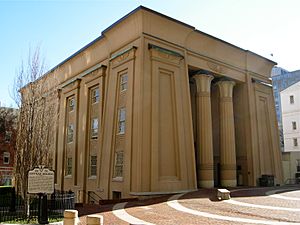
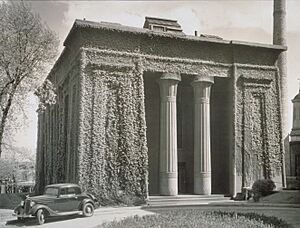
Warren W. Brandt was VCU's first president. During his time, 32 new degree programs were added. New buildings were also built, like the James Branch Cabell Library.
In the 1980s, under President Edmund Ackell, VCU changed how it was run. He helped create new plans for the university's future. He also made it easier for the community to use VCU's research.
Eugene Trani became president in 1990. VCU grew a lot during his time, becoming one of Virginia's largest universities. The number of students grew from about 21,000 to over 32,000. VCU was the first university in Virginia to have over 30,000 students. Many new buildings and renovations happened under his leadership.
In 2013, VCU received a $62 million grant. This money was for a big research group studying brain injuries in service members and veterans. In 2010, VCU also got a $20 million grant to help turn lab discoveries into treatments for patients.
Michael Rao became VCU's fifth president in 2009. He has overseen a big increase in students, funding, and buildings. New engineering and science buildings were built. In 2022, VCU received a huge gift of $104 million. This was the largest gift in the university's history. It will help create a new institute for liver disease research. VCU now ranks among the top 50 universities for research spending.
VCU Campuses
Virginia Commonwealth University has two main campuses in Richmond, Va.. These are the Monroe Park Campus and the MCV Campus. VCU also has a campus in Education City, Doha, Qatar, and other research places.
Monroe Park Campus
This campus is about 90 acres. It was named after the nearby city park, Monroe Park. The Monroe Park Campus has most of VCU's general education buildings. It is located near downtown Richmond. Before VCU was formed, this campus was home to the Richmond Professional Institute. Today, it has a mix of new and old buildings. Over 40 buildings were built before 1900.
MCV Campus
The MCV Campus is about 52 acres. It is home to the VCU Medical Center. This includes schools for Medicine, Dentistry, Pharmacy, Nursing, and Health Professions. The VCU Massey Cancer Center and the Children's Hospital of Richmond are also here. This campus is a key part of Richmond's old Court End area. It is close to the state capitol.
VCU Satellite and Research Locations
- Virginia Bio-Technology Research Park: This park started in 1992. It is a joint effort by VCU, the City of Richmond, and Virginia. It has over 60 life science companies and research groups. More than 2,200 scientists work here.
- Inger and Walter Rice Center for Environmental Life Sciences: This center is on 494 acres along the James River. It focuses on studying large rivers and their surrounding lands.
- VCU Medical Center at Stony Point: This is a medical center in southwestern Richmond.
- VCU School of Medicine Inova Campus: A medical school campus.
- VCU School of Pharmacy Inova Campus: A pharmacy school campus.
- VCU School of Pharmacy University of Virginia Division: Another pharmacy school location.
VCUarts Qatar Campus
VCUarts Qatar is VCU's School of the Arts campus in State of Qatar. It opened in 1998. It was the first university to open in Education City. VCUarts Qatar offers Bachelor of Fine Arts and Master of Fine Arts degrees.
How VCU is Organized
Virginia Commonwealth University is set up as two main parts: the university and the VCU Health System. The president is the main leader of VCU. The university has twenty different divisions.
A group of sixteen people, called the board of visitors, helps lead the university. The governor of Virginia chooses these board members. There are also six non-voting members who are students and faculty. The VCU Health System has its own separate board of directors.
VCU has about 3,300 staff members and 2,000 professors. VCU has a large fund of $2.72 billion. This is the second largest fund for a public school in Virginia. VCU gets money from the state, federal government, and private donations. In 2022, VCU received over $400 million for research. Many local businesses also give money to VCU.
Academics at VCU
VCU Schools
- Robertson School of Media
- Wilder School of Government and Public Affairs
- College of Health Professions
- School of the Arts
- School of Business
- School of Dentistry
- School of Education
- College of Engineering
- School of Medicine
- School of Nursing
- School of Pharmacy
- School of Population Health
- VCU School of Social Work
- School of World Studies
- VCU University College
- College of Humanities & Sciences
Programs and Degrees
VCU offers many types of degrees. These include bachelor's, master's, and doctoral degrees. They also have professional and certificate courses.
Many of VCU's programs are special and only found in Virginia. For example, the Homeland Security and Emergency Preparedness major. The university offers 225 different degrees in arts, sciences, and humanities.
The medical campus gives students chances for advanced study. Some students can get guaranteed admission to health science programs if they keep high grades.
Life Sciences at VCU
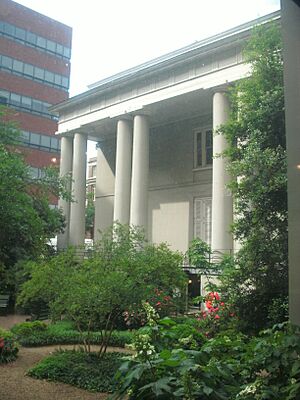
VCU Life Sciences has three main parts. These are the Center for the Study of Biological Complexity, the Center for Environmental Studies, and the Rice Center for Environmental Life Sciences. VCU Life Sciences offers programs for undergraduate and graduate students. It also has a PhD program. This program involves many different fields of study.
VCU da Vinci Center
VCU's Schools of Arts, Business, and Engineering work together at the VCU da Vinci Center. Students from these schools work on design challenges from companies. The College of Humanities and Sciences also joined the center. The da Vinci Center offers a certificate and a master's degree in product innovation. The master's degree is the first of its kind in the United States.
Rankings and Awards
| ARWU World | 201–300 |
|---|---|
| ARWU National | 62–82 |
| THES World | 401–500 |
| USNWR National University | 142 |
| Washington Monthly National University | 137 |
| Forbes | 447 |
In 2023, U.S. News & World Report ranked VCU as a top university. It was ranked No. 142 nationally and No. 76 among public universities in the U.S.
VCU School of the Arts (VCUarts) was ranked the No. 1 public university art school in the country in 2015. It was also ranked No. 4 among all art schools, public and private. The New York Times called it a rare public university that focuses on the arts. The VCU Brandcenter, a graduate program in advertising, has also been ranked highly.
Several programs in VCU's VCU College of Health Professions are highly ranked. Nurse Anesthesia is ranked #1, Rehabilitation Counseling is #4, and Health Administration is #5.
VCU Engineering started in 1996 and has grown a lot. In 2014, its Biomedical Engineering program was ranked 58th. Its Computer Engineering program was 84th.
In 2016, U.S. News & World Report ranked VCU School of Pharmacy 17th among pharmacy schools.
Notable Faculty and Alumni
One VCU faculty member and one alumnus have won a Nobel Prize. Baruj Benacerraf, who studied at the Medical College of Virginia, won the 1980 Nobel Prize in Physiology or Medicine. John Fenn, a professor at VCU, won the 2002 Nobel Prize in Chemistry.
In medicine, VCU has had professors elected to the American Academy of Arts and Sciences' Institute of Medicine. Famous past faculty include Charles-Édouard Brown-Séquard, who has a medical condition named after him. Hunter McGuire, a Confederate surgeon, founded a medical college that later merged with MCV. The Hunter Holmes McGuire Veterans Administration Medical Center is named for him.
The theatre department has talented people like two-time Tony Award nominee Toni-Leslie James. The department's chair, Sharon Ott, also received a Tony Award.
VCU Libraries
The VCU Libraries are very busy. They have over 3 million books and many journals. About 2.5 million people visit the libraries each year. The James Branch Cabell Library is on the Monroe Park Campus. It has one of the largest collections of book art in the Southeast. It also has a huge collection of graphic novels and comic books.
The Health Sciences Library on the MCV Campus has the largest medical collection in Virginia. It has many old medical journals. Its Medical Artifacts Collection has over 6,000 medical tools and equipment.
In 2016, the Cabell Library added a large new section. This new space has 25 new study rooms. It also has a special room for graduate students and faculty. There's a silent reading room and "The Workshop" for multimedia projects. It also has a gaming suite and a makerspace.
Blackbird Journal
Blackbird Journal started in 2002. It is a literary magazine from VCU's Creative Writing Program. It publishes poems by many different poets.
Research at VCU
Virginia Commonwealth University is one of the top 3 research universities in Virginia. In 2022, VCU received over $400 million for research. This puts it in the top 50 nationally. U.S. News & World Report ranks VCU among the top 30 most innovative universities.
Research Centers and Institutes
VCU has many research centers and institutes, including:
- Center for the Study of Tobacco Products
- Virginia Center on Aging
- Virginia Institute for Psychiatric and Behavioral Genetics
- Wright Center for Clinical and Translational Research
- da Vinci Center for Innovation
- Rice Rivers Center
- Center for Environmental Studies
- Massey Cancer Center
- Grace E. Harris Leadership Institute
- Humanities Research Center
- Kornblau Institute
- Pauly Heart Center
- Center for Biological Data Science
- Institute for Creative Research
- Center on Society and Health
- Center for Drug Discovery
- Institute for Engineering and Medicine (IEM)
- Philips Institute for Oral Health Research
- Center for Public Policy
- Cybersecurity Center
Student Life at VCU
About 57% of VCU students are female, and 42% are male. About 15% of students are from outside Virginia. Most students (85%) are from Virginia. The student body is diverse, with students from many different backgrounds.
Where Students Live
More than 79% of new VCU students live on campus. VCU has dorms for about 6,200 students. Many older students live in apartments near campus. These are in areas like The Fan, Oregon Hill, or Carver. They can easily walk or bike to classes.
Dining Options
VCU's dining services are run by ARAMARK Higher Education. Students living in dorms must buy a meal plan.
Student Activities
Student Organizations
VCU has over 500 student groups. Students can join groups based on their culture, religion, hobbies, or special interests. There are also two student government groups, one for each campus.
VCU also helps with the largest French Film Festival in the United States. It started in 1993.
Student Media
VCU has many student-run media groups. These let students share their voices:
- Amendment – A yearly literary journal.
- Annum Arcanum – A yearly literary journal focused on genre fiction.
- The Commonwealth Times – A student newspaper published weekly online and in print.
- Emanata – A student-run comics collection published every spring.
- Ink Magazine – A multi-ethnic student news magazine.
- Pwatem – An undergraduate literary journal.
- River City Fashion – A student-run fashion blog.
- WVCW – A student-run online radio station.
Altria Theater
Altria Group, a company that often supports VCU, bought the theater on campus. It used to be called The Mosque and the Landmark Theater. The Altria Theater was built in the 1920s. It has a Moorish Revival style.
Many famous performers have played here, like Elvis Presley and Jimi Hendrix. Popular Broadway shows like Wicked and The Lion King have also visited.
Recreational Sports
VCU has sports facilities on both campuses. The Cary Street Gym, opened in 2010, has a large fitness center. It also has a rock climbing wall, two pools, and courts for basketball and racquetball.
The MCV Campus Recreation and Aquatic Center has space for basketball, volleyball, and other sports. It also has a pool.
The VCU Outdoor Adventure Program plans trips for students. These trips include camping, kayaking, and white-water rafting.
Service Learning
Service learning at VCU means students take classes where they help the community. Over 3,000 VCU students are involved in service learning.
Greek System
Virginia Commonwealth University has 36 different fraternities and sororities. Over 1,700 students are part of these groups. About 6.3% of women and 8% of men at VCU join a fraternity or sorority.
Campus Safety
VCU has its own police force with 99 officers. It also has over 200 security staff. VCU offers a free Security Escort service (RAM SAFE) to help students get around safely. There are also over 370 emergency phones on campus.
VCU Athletics
VCU has been competing in NCAA Division I sports for over 30 years. The VCU Rams have won more than 30 conference championships. They have also played in many NCAA post-season events. This includes a trip to the Final Four in men's basketball in 2011. VCU has 16 varsity teams that play in the Atlantic 10 Conference (A10).
VCU Men's tennis is one of the school's most successful programs. The team's coach, Paul Kostin, has won over 900 matches. The Men's tennis team has won 12 conference championships. They have also been in the NCAA tournament 18 times. In 2000, the team finished 2nd in the NCAA Finals.
The VCU women's tennis team, also coached by Paul Kostin, has won 3 conference championships. They have been in the NCAA tournament 12 times.
VCU Baseball has won 3 conference championships. They have been to 8 NCAA Regionals. The team plays its games at The Diamond (Richmond, Virginia).
Other VCU sports include basketball, cross country, field hockey, golf, soccer, track and field, volleyball, and women's lacrosse.
VCU also has many student-run club teams. These include cheerleading, baseball, softball, rugby union, ultimate, lacrosse, cycling, and dodgeball.
Men’s Basketball
VCU reached the Final Four in the 2011 NCAA tournament. The team has won 9 conference championships. The most recent was in 2015. The VCU Rams play at the Stuart C. Siegel Center. They have one of the best home winning records in Division I basketball.
In the 2011 NCAA Men's Division I Basketball Tournament, VCU was chosen to play. Many people thought they shouldn't have been picked. But VCU proved them wrong! They beat USC in the first game. Then they upset Georgetown and Purdue. This sent them to the Sweet 16 for the first time. In the Sweet 16, VCU beat Florida State. Then, they beat the No. 1 seed Kansas to reach the Final Four. They lost to Butler in the Final Four. The 2010–11 VCU Rams men's basketball team finished sixth in the coaches' poll. This was the highest ranking in VCU's history.
Women's Basketball
The VCU Rams Women's team had its best season in 2008–2009. They finished with 26 wins and 7 losses. They were perfect at home, with 16 wins and 0 losses. They went to their first NCAA tournament game but were eliminated by Rutgers. The 2009–10 team also reached the Sweet 16 in another tournament.
Athletic Rivals
VCU's main rival is Old Dominion University. Their basketball games are often called the best college basketball rivalry in Virginia. VCU also has a rivalry with the University of Richmond. This rivalry is called the "Black & Blue Classic."
Rowdy Rams Fan Group
The Rowdy Rams is a student group that supports VCU athletics. They especially cheer for the men's basketball team. The group started in 2002–2003. In 2013, the Rowdy Rams won the Naismith Student Section of the Year award. This award goes to the most passionate student section in college basketball.
Notable VCU Alumni
VCU alumni are famous in many different areas. Patch Adams is a doctor, author, and clown. Christopher Poole created 4chan, a website that changed how people communicate online. David Baldacci is a best-selling author. William Gifford is the CEO of Altria, a big tobacco company. VCU has also produced many well-known artists and musicians. These include Lamb of God, GWAR, Sam Beam, Lucy Dacus, and Car Seat Headrest.
See also
 In Spanish: Universidad de la Mancomunidad de Virginia para niños
In Spanish: Universidad de la Mancomunidad de Virginia para niños
- Institute for Contemporary Art, Richmond
- VCU School of the Arts


